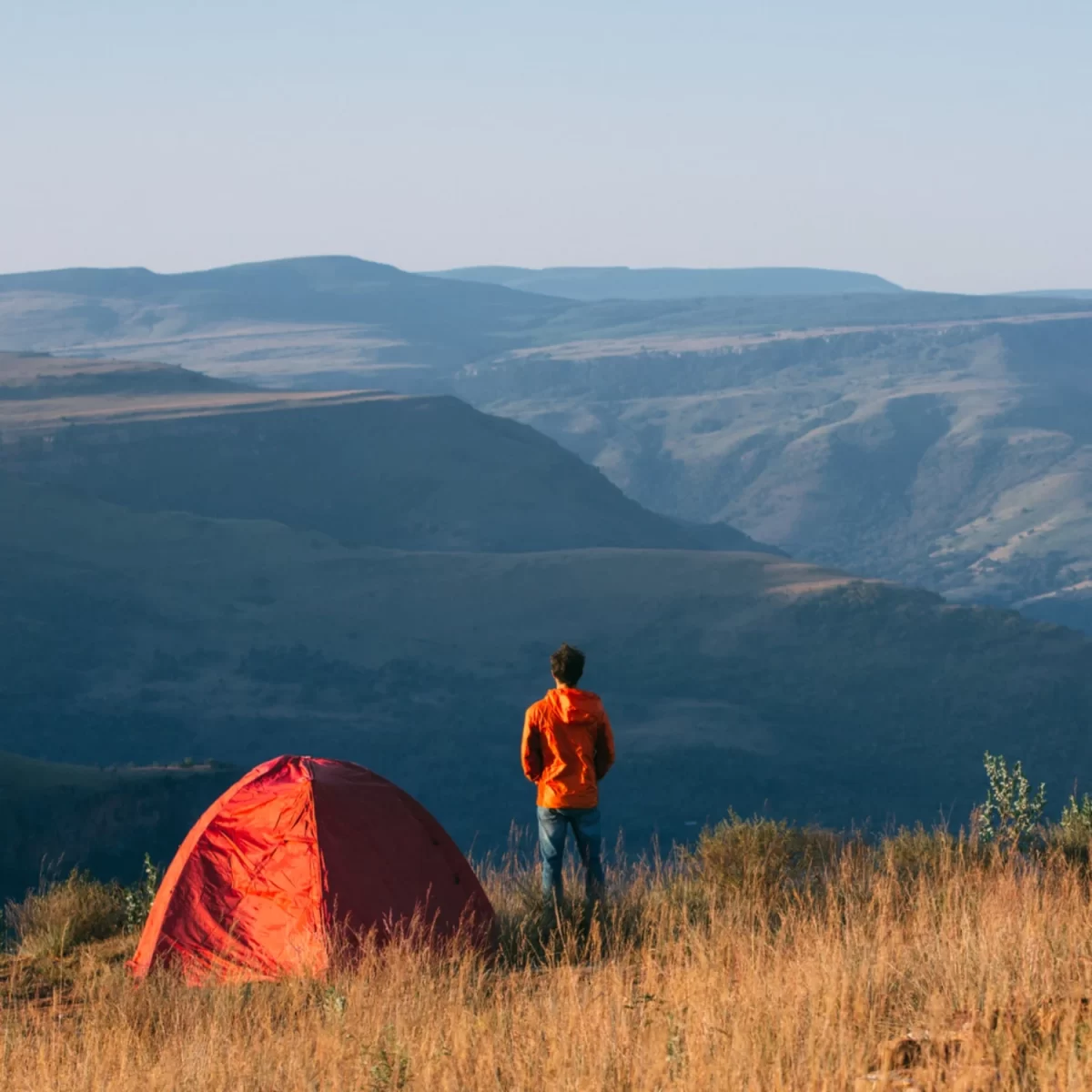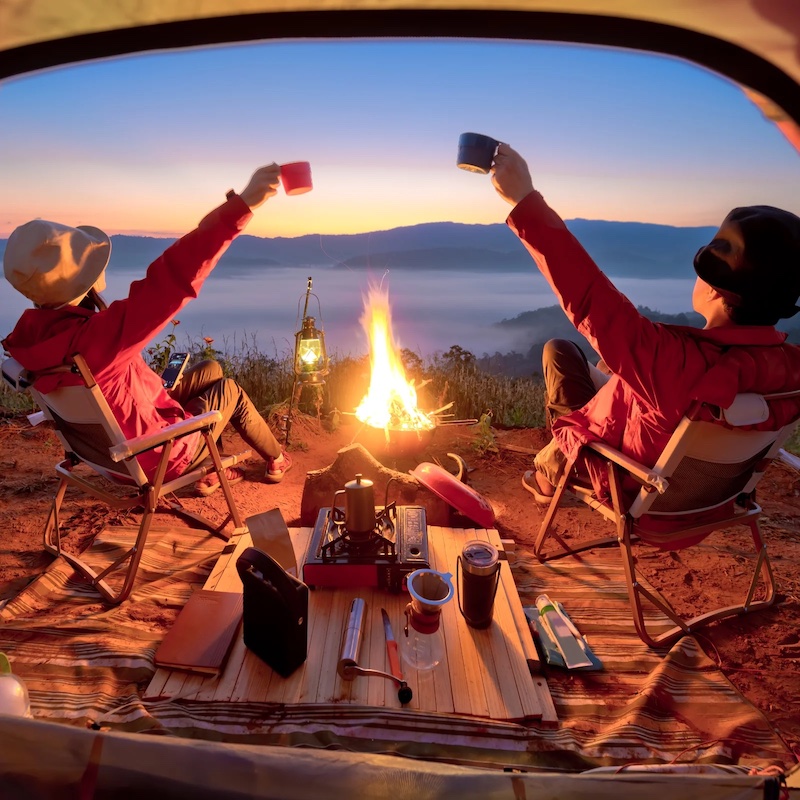Introduction
Camping is a recreational outdoor activity that involves staying overnight in a tent, camper, or other temporary shelter. It often involves activities such as hiking, fishing, swimming, and cooking over an open fire. Camping can take place in various settings such as national parks, campgrounds, and wilderness areas, and it provides an opportunity to connect with nature and enjoy the great outdoors.
Camping trips are a fantastic way to get in touch with nature, relax, and have an adventure. Whether you are a seasoned camper or a newbie, there is always something exhilarating about escaping the hustle and bustle of everyday life to spend a few days in the great outdoors. From setting up camp to exploring the wilderness, a camping trip can be a truly transformative experience.
Part 1: Planning and Preparation
Level 1: The Essentials
Before embarking on a camping trip, it’s crucial to have the right gear and supplies. A sturdy tent, sleeping bags, cooking equipment, and suitable clothing are just a few of the essential items to pack. Additionally, food, water, and first aid supplies should be on your checklist to ensure a safe and enjoyable trip.
Level 2: Research and Destination
Choosing the perfect camping destination is an important part of the planning process. Researching potential locations, considering the weather, and understanding the rules and regulations of the area are essential. Whether it’s a national park, a secluded forest, or a coastal campsite, each location offers a unique camping experience.
Part 2: Setting Up Camp
Level 1: Pitching the Tent
Setting up your home away from home can be an adventure in itself. It’s important to find a level and sheltered spot, and follow the instructions for your particular tent carefully. Once the tent is set up, arranging the sleeping area and ensuring adequate protection from the elements is essential for a comfortable stay.
Level 2: Creating a Campsite
In addition to the tent, creating a designated campsite area with a fire pit, seating, and space for cooking is necessary. Organizing kitchen supplies and setting up a camping stove or barbeque can make meal preparation an enjoyable part of the experience. Consideration for the surroundings and leaving no trace is essential when setting up a campsite.
Part 3: Exploring the Wilderness
Level 1: Hiking and Nature Walks
Exploring the surrounding wilderness is one of the most rewarding aspects of a camping trip. Whether it’s a leisurely nature walk or a more challenging hike, there are endless opportunities to experience the natural beauty and wildlife. It’s important to be prepared with appropriate footwear, water, and a map of the area.
Level 2: Wildlife Observation and Photography
Observing and capturing the local flora and fauna can be a memorable part of any camping trip. From spotting birds and insects to observing larger animals such as deer or elk, it’s essential to maintain a safe distance, respect the wildlife, and capture the experience through photography or sketching.
Part 4: Campfire Stories and Relaxation
Level 1: Gathering around the Campfire
One of the most cherished camping traditions is the campfire. Gathering around the crackling flames, sharing stories, and cooking delicious campfire meals can create lasting memories. Whether it’s roasting marshmallows or simply enjoying the warmth, the campfire is a central part of the camping experience.
Level 2: Stargazing and Relaxation
Once the sun sets, stargazing and relaxation become natural activities. Away from the city lights, the clear night sky offers a breathtaking view of the stars and constellations. Finding a comfortable spot to lay back, unwind, and soak in the tranquil atmosphere completes the camping experience.
Part 5: Packing Up and Reflection
Level 1: Leaving No Trace
When it’s time to pack up and leave the campsite, it’s essential to ensure that no trace of your presence remains. Gathering all rubbish and waste, extinguishing the campfire, and leaving the area as you found it preserves the natural environment for future campers to enjoy.
Level 2: Reflecting on the Experience
As the camping trip comes to an end, taking a moment to reflect on the experience, cherish the memories, and plan for future adventures can be a rewarding way to close the chapter. Whether it’s journaling, sharing stories with fellow campers, or simply taking in the final moments in the wilderness, reflecting on the trip can be a transformative experience.
Part 6: The Unexpected Storm
As the group settled into their camping site, they noticed the clouds building up in the sky. The weather had been perfect all day, so they weren’t too concerned. However, as they finished cooking dinner, the first drops of rain began to fall. Within minutes, a full-blown storm had descended upon them.
The wind howled through the trees, and the rain came down in sheets. The group quickly scrambled to secure their belongings and huddle together under a tarp for shelter. Despite the chaos of the storm, they found themselves laughing and bonding over their shared experience. As the storm raged on, they realized that this unexpected turn of events had brought them even closer together.
Part 7: A Night of Bonding
The storm finally passed, leaving behind a cool, crisp night. With the sky now clear and full of stars, the group decided to start a campfire. They sat around the crackling flames, sharing stories and roasting marshmallows. The warmth of the fire and the quiet of the night created a comfortable atmosphere, and the group found themselves opening up to one another in a way that hadn’t happened before.
They talked about their fears, their dreams, and their favorite memories. Some shared personal struggles they were facing, and others offered words of support and encouragement. As the night drew on, they all felt a deep sense of connection and understanding, knowing that they had each other’s backs no matter what.
Part 8: The Morning Farewell
As the sun began to rise over the horizon, the group knew their camping trip was coming to an end. They packed up their belongings and shared one last breakfast together, savoring the final moments of their adventure. They exchanged phone numbers and promised to stay in touch, knowing that the memories they had made would bond them forever.
As they parted ways, each member of the group felt a sense of gratitude for the experience they had shared. They had faced challenges, embraced nature, and formed friendships that would last a lifetime. As they drove away from the campsite, they looked forward to the next adventure that awaited them, knowing that they were forever changed by their camping trip.
Conclusion
Camping is an outdoor recreational activity where individuals or groups set up temporary shelters, such as tents or RVs, and spend time outdoors in natural settings. This can include activities such as hiking, fishing, cooking over a campfire, and enjoying the beauty of the natural environment. Camping can be done in designated campgrounds, national parks, or other public lands, as well as in more remote or rugged locations for a more adventurous experience. It is a popular way to disconnect from the hustle and bustle of daily life and connect with nature.
A camping trip offers a myriad of experiences and presents an opportunity to connect with nature, relax, and create lasting memories. From planning and setting up camp to exploring the wilderness and reflecting on the experience, each aspect of the trip contributes to a fulfilling and unforgettable adventure. Whether it’s finding solace in nature, overcoming challenges, or simply enjoying the outdoors, a camping trip is an experience that can leave a lasting impact.



